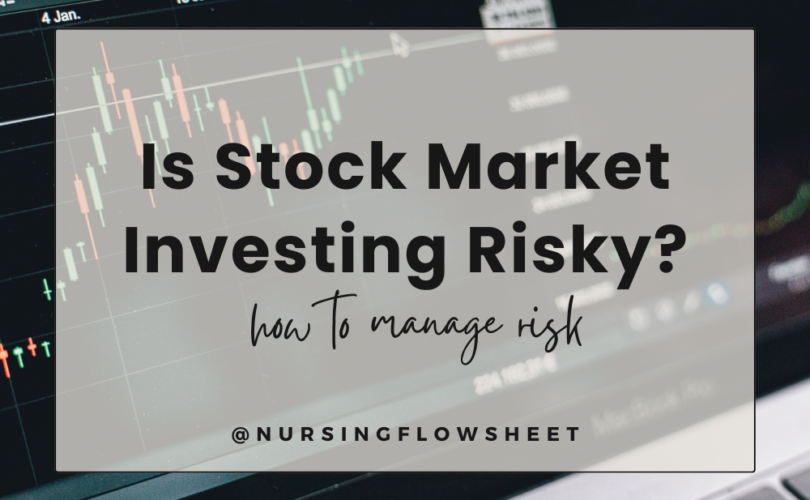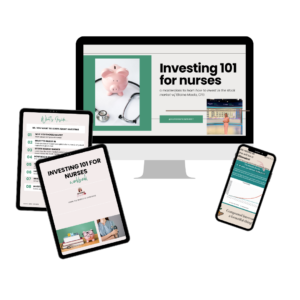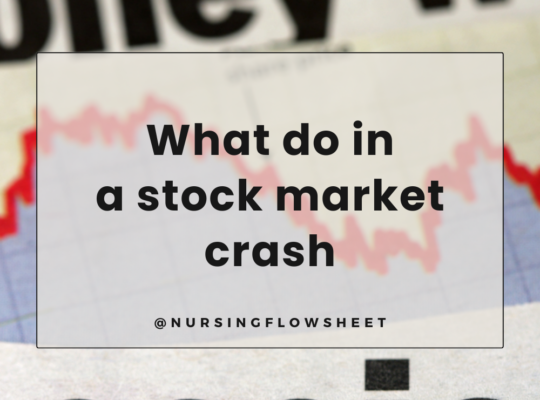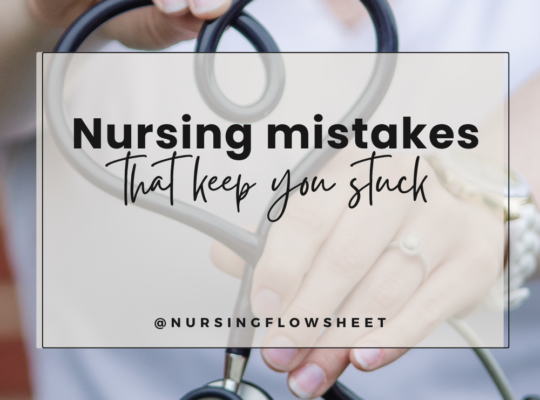Last week, I hosted my free investing class and most of the students talk about the fear of stock market investing because of the risk of losing money.
Working in healthcare, you’re already familiar with the concept of risk. Every shift, you make critical decisions that could have significant outcomes. But when it comes to investing, many people feel unsure, often asking, “Is investing too risky?” While it’s true that all investments carry some level of risk, the real question is whether the potential rewards outweigh those risks. Spoiler alert: when done wisely, investing can be one of the most powerful tools for achieving financial freedom and security.
In this blog post, we’ll break down the perceived risks of investing, why it’s essential to invest as a nurse, and how you can mitigate those risks to make your money work for you.
1. What Is the Risk in Stock Market Investing?
Investment risk is the possibility of losing some or all of the money you’ve invested. This can happen for various reasons, including:
- Market Fluctuations: The stock market moves up and down, influenced by economic factors, political events, and investor sentiment.
- Business Failures: If you invest in individual companies and they perform poorly, the value of your investment may drop.
- Interest Rate Changes: Bonds and other fixed-income investments are sensitive to interest rates, and changes can affect their value.
However, just as every risk in nursing has a way to manage it, investment risks can also be controlled and balanced through smart strategies like diversification, understanding your risk tolerance, and investing for the long term.
2. Why You Should Invest as a Nurse
You might be wondering why you should bother with investing at all if there’s a risk of losing money. The answer is simple: investing is one of the best ways to grow your wealth and secure your financial future.
Here’s why investing is crucial, especially for nurses:
A. Building Wealth Over Time
One of the most significant advantages of investing is the power of compound interest. When you invest, not only does your money grow, but the earnings from your investments also start to earn interest. This snowball effect means that the earlier you start, the more your investments will grow over time.
Let’s say you start investing $200 a month at age 25 and earn an average 7% annual return. By the time you’re 65, you could have over $480,000. But if you wait until age 35 to start, you would only accumulate around $240,000 by the same age—despite investing the same amount each month!
B. Securing Your Retirement
As a nurse, you likely have access to retirement plans like a 401(k) or 403(b) through your employer. Relying on your regular paycheck without investing it for the future might leave you unprepared for retirement. Social Security benefits may not be enough to cover your expenses when you retire, and you don’t want to be working long shifts into your 60s or 70s just to make ends meet.
Investing gives you the ability to retire on your terms. By contributing to a retirement plan and investing consistently, you can build a nest egg that allows you to step away from the long hours of nursing when you’re ready.
C. Hedge Against Inflation
Inflation slowly erodes the purchasing power of your money over time. The cost of living increases every year, and if you’re not growing your wealth, your money will lose value. Historically, investing in the stock market has outpaced inflation, making it one of the most effective ways to ensure your savings don’t lose their value.
D. Achieving Financial Freedom
Imagine a life where you can cut back on shifts, spend more time with your family, or even pursue other passions like travel or starting a business. When you invest wisely, you create a financial cushion that allows for more freedom and flexibility in your life. You can work on your own terms and enjoy the rewards of your hard-earned money.
3. How to Manage Risk While Investing
So, how do you invest without losing sleep over potential risks? Here are some practical steps you can take to reduce risk while still growing your wealth:
A. Diversify Your Investments
One of the golden rules of investing is not to put all your eggs in one basket. By diversifying—investing in different types of assets (stocks, bonds, real estate, etc.)—you reduce the risk that one poor-performing investment will hurt your entire portfolio.
For example, instead of investing in just one company’s stock, consider a broad market index fund that includes hundreds or even thousands of companies. This gives you exposure to a wide range of industries and geographies, helping to smooth out the ups and downs of the market.
B. Understand Your Risk Tolerance
Everyone has a different comfort level when it comes to risk. As a nurse, you might be more conservative with your money, preferring safer, more predictable returns. Or, you might be willing to take on more risk in pursuit of higher gains.
It’s important to assess your own risk tolerance before investing. If market swings make you anxious, a more conservative approach with a mix of stocks and bonds might be the best option for you.
C. Invest for the Long Term
In the short term, markets can be volatile, but over the long term, they tend to grow. The key to successful investing is patience. Instead of trying to time the market—buying when you think prices are low and selling when they’re high—focus on time in the market.
The longer you stay invested, the more opportunity your investments have to recover from short-term downturns and benefit from long-term growth.
D. Maximize Employer Benefits
If your employer offers matching contributions for a 401(k) or 403(b), make sure you’re taking full advantage. Employer matching is essentially free money that can significantly boost your retirement savings.
E. Educate yourself & Seek Professional Advice
Education is best investment. If you are ready to invest your hard-earned money, you can enroll in my class: Investing 101 for Nurses
If you’re new to investing, consider consulting with a financial advisor who can help you develop a strategy that aligns with your financial goals and risk tolerance. Many nurses don’t have time to manage their investments actively, so having a trusted professional can take the guesswork out of the process.
4. Investing Is Essential for Nurses
In a profession like nursing, where shifts can be long and stressful, it’s crucial to take steps now to ensure your financial future is secure. Investing, when done responsibly, is not just about making more money—it’s about creating freedom. Freedom from financial stress, freedom to work fewer hours, and the freedom to enjoy your life more fully.
While investing does carry some level of risk, avoiding investing is arguably even riskier. Over time, inflation and missed opportunities for growth can leave you far behind. By taking a thoughtful, diversified approach, you can make investing part of a plan that leads to financial independence and security.
Final Thoughts
As a nurse, you’re already well-versed in managing risk, making careful decisions, and planning for the future. Investing is just another tool in your financial toolkit that can bring you closer to your long-term goals. While it can feel intimidating at first, learning how to invest wisely will pay off—not just in terms of your finances but also in the freedom and security it provides.








